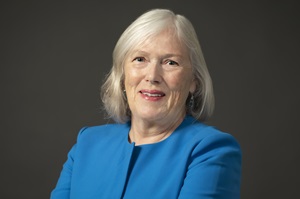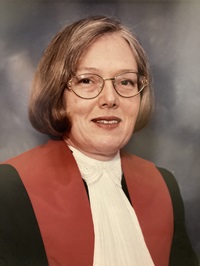 Retired Court of Queen’s Bench of Alberta Justice Adèle Kent loved school while growing up in Calgary and was heading towards an educational career path as a teacher.
Retired Court of Queen’s Bench of Alberta Justice Adèle Kent loved school while growing up in Calgary and was heading towards an educational career path as a teacher.
However, after developing strong interests in government, law and international relations, she instead completed a B.A. (Hons) degree in Political Science, did a work stint with the Canadian Department of Immigration and then earned her LLB and began practicing law.
Still, it will not come as a surprise to learn that, not too long after being appointed to the Bench, Justice Kent began volunteering with the National Judicial Institute (NJI), designing and planning educational programs for Canadian judges.
And so, after 27 years of service — both as a QB Justice and the eventual Chief Judicial Officer (CJO) of the NJI — it will be even less of a surprise to discover that the English and French speaking jurist’s retirement plans include the standard travel and reading, but also improving her Spanish, doing a little work in judicial education and possibly taking some university classes.
I guess you could say that learning is part of her DNA. In fact, after law school, Justice Kent learned how to swim and downhill ski and took up both piano and the flute.
She also has boundless energy and loves a challenge. In fact, during the pandemic, the avid jogger set out to jog the entire perimeter pathway system around Calgary in stages.
So, what does Justice Kent have to say about retirement and her judicial career?
“I am going into retirement excited and apprehensive; excited at new adventures and apprehensive that I will find enough to do,” she says. “It has been a most fulfilling career. Never a moment of regret at taking the appointment.”
Justice Kent attended the University of Calgary for her undergraduate studies, earning her degree in 1970, and later attended Edmonton’s University of Alberta Faculty of Law, graduating in 1977. During her time at Law School, she worked at Student Legal Services and served as its Chair during her third year.
Her articles were split between a clerkship for Chief Justice Valentine Milvain of the Supreme Court of Alberta (the predecessor of the Court of Queen’s Bench) and a small law firm in Calgary. She was admitted to the Alberta Bar in 1978.
She returned to Edmonton and partnered with Andrew C.L. Sims, Q.C. in a small law firm that concentrated on labour and criminal law. During her time at Sims, Kent, she also taught Land Titles as a sessional instructor at the Law School. When Sims was appointed Chair of the Alberta Labour Relations Board, she took a position at Field & Field (now Field Law), first as an associate and then partner.
She practiced law in Edmonton and then in Calgary, focusing her practice in the latter years on health law and construction litigation.
 Justice Kent was appointed to the Court of Queen’s Bench in February 1994.
Justice Kent was appointed to the Court of Queen’s Bench in February 1994.
During her time with QB, she took a leadership role and contributed an enormous amount of time to sitting on various committees, including being chair of the Communications Committee, the Strategic Planning Committee and the Pandemic Planning Committee.
The latter took place when the H1N1 virus threatened Alberta in 2014 and the pandemic response plan she prepared became the model for the Court’s 2020 COVID response plan.
Justice Kent was also an early member of QB's Commercial Group in Calgary. As well, she took on many difficult and demanding cases.
When asked about some of them, she says one of the most challenging ones was a 2002 case involving a Jehovah’s Witness teenager with leukemia who was refusing to accept blood transfusions. Read the decision here: https://bit.ly/3wBZJXD
“I also did a big oil and gas case which required me to understand drilling North Sea oil. I like the opportunity and stimulus of learning new things,” she says. “The worst case? I cannot think of one, but cases involving children who were not receiving the nurture they needed from one or both parents were difficult.”
Justice Kent also participated in national judicial activities. She was appointed the Alberta, NWT and Nunuvut member of the Ethics Advisory Committee, a joint committee of the Canadian Judicial Council and the Canadian Superior Court Judges Association which provides confidential ethical opinions to federally appointed judges. She also held the position of co-chair for five years.
During a sabbatical year, she published a book Medical Ethics: The State of the Law. The book addresses the medical and health-related ethical issues from birth to death, and how Canadian courts grapple with these difficult issues.
She became a supernumerary judge after serving as a full-time Justice for 17 years.
Since her early days volunteering with the NJI, Justice Kent remained committed to judicial education. She led planning committees for programs on Civil Law, Science and Judicial Ethics, sat on committees for social context seminars on race, religion and unconscious bias, and led judicial faculty development seminars that taught judges how to work with their courts to design courses that tackled complex social issues like domestic violence and poverty.
She also began to work in the NJI’s international department and went on exchanges to more than 15 countries, teaching and learning from colleagues on every continent.
Her abiding interest in education led to her becoming the NJI’s CJO, leading the day-to-day development of judicial curriculum and programming and working with other judicial institutions and Chief Justices across Canada. She will step down as CJO in June 2021.
Justice Kent says she is going to miss the collegiality at QB.
“I was surprised when I was appointed on how helpful and friendly all my colleagues were and that atmosphere has not changed, something I credit my Chief Justices Kenneth Moore, Allan Wachowich, Neil Wittmann and Mary Moreau fostering,” she says.
Chief Justice Moreau says Justice Kent’s dedication to judicial education and judicial ethics has improved the work of thousands of judges across Canada and notes that she emulates the words often attributed to Mahatma Gandhi: “Be the change that you wish to see in the world.”